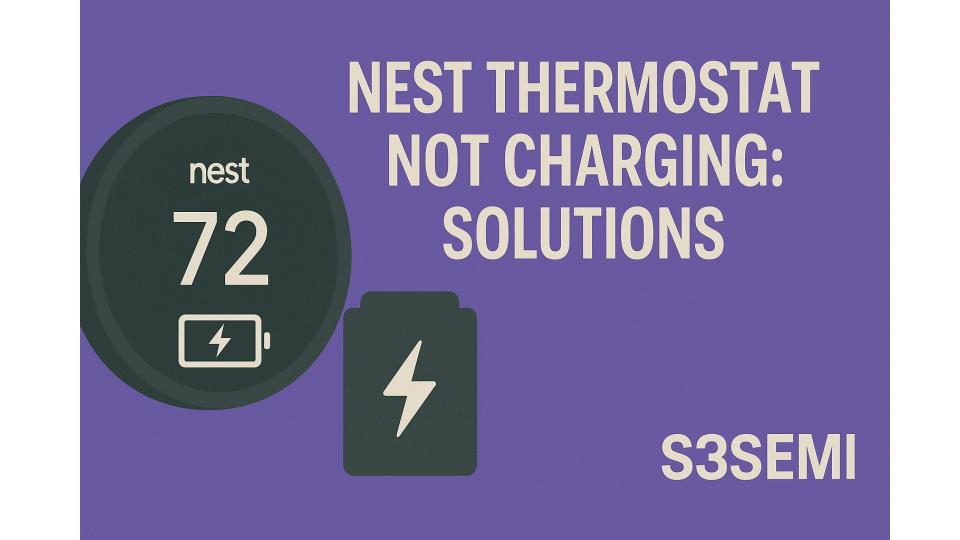At times I’ve noticed my Nest thermostat not charging and it’s frustrating. If your thermostat isn’t powering up properly, you’re not alone. Let’s explore why this happens and how to fix it.
Understanding Nest Thermostat Charging Issues
Charging problems can stop your Nest thermostat from working properly. Understanding how it charges and what signs show charging issues helps fix the problem fast.
🔋 How the Nest Thermostat Charges
Nest thermostats charge using power from your HVAC system through the thermostat wires. The C-wire (common wire) is the key source of continuous power. If your system lacks a C-wire, Nest uses power stealing from other wires to keep the battery charged, but this can be unreliable. The built-in rechargeable battery stores this energy and powers the screen and functions. Charging stops if your HVAC system isn’t supplying power or wiring isn’t correct.
⚠️ Common Signs of Charging Problems
Look for these signs to know if the Nest isn’t charging:
- Screen dims or turns off unexpectedly
- Frequent low battery warnings
- Nest reboots or loses settings often
- Blank screen despite HVAC running
- Charging icon doesn’t appear
If your Nest thermostat shows these issues, it usually points to power supply or wiring faults that prevent charging.
Causes of Nest Thermostat Not Charging
Understanding why your Nest thermostat isn’t charging helps fix the problem faster. I’ve broken down the main causes to check first.
🔌 Wiring and Power Issues
Poor or missing wiring often stops your Nest from charging. The thermostat relies heavily on the C-wire to get continuous power.
- Loose wires—especially the C, Rh, and Rc wires—can interrupt power flow.
- Missing C-wire forces the Nest to “power steal” from other wires, which may be unreliable.
- Faulty HVAC system wiring or blown fuses cut power to the Nest.
Always confirm all wires sit firmly in their terminals before assuming a battery issue. Check your furnace fuse and breaker box as well.
⚡ Faulty C-Wire or Power Connector
The C-wire acts as the charger for your Nest. When it’s damaged, disconnected, or missing, charging becomes difficult.
- A broken C-wire means no consistent power source.
- Older homes might lack a C-wire entirely.
- Using a Power Connector accessory can replace the need for a C-wire but must be installed correctly.
If your C-wire looks fine but the Nest still won’t charge, the issue could be the wire’s internal damage or poor connection points on the base or control board.
🔋 Battery and Hardware Malfunctions
Sometimes the Nest’s internal components cause charging trouble.
- A worn-out rechargeable battery fails to hold charge after repeated cycles.
- Physical damage inside the thermostat can cut power flow.
- Firmware glitches occasionally prevent proper charging recognition.
Try charging the Nest externally via USB to isolate battery problems. If the screen stays dim or blank even then, hardware faults likely exist and require professional repair or replacement.
Troubleshooting Steps for Nest Thermostat Not Charging
Here are key steps to fix charging issues with your Nest thermostat. Each step tackles different causes to get your device powered again.
🔧 Checking the Wiring and Connections
Start by inspecting the wiring behind the thermostat. Loose or missing wires often cause charging problems.
- Remove the Nest from its base.
- Confirm all wires—especially C, Rh, and Rc—are fully connected and secured.
- Look for damaged or frayed wires that might interrupt power flow.
- Reattach the thermostat and check for charging status.
If your system lacks a C-wire, power stealing from other wires may cause intermittent charging. In that case, installing a C-wire or Nest’s Power Connector improves reliability.
🔄 Resetting the Thermostat
Resetting can resolve software glitches affecting charging.
- Press and hold the thermostat display for about 10 seconds.
- Wait for the device to restart and display the Nest logo.
- Observe if the battery charging icon returns.
If the Nest remains unresponsive, disconnect it from the base and charge externally via USB for 1–2 hours. This helps isolate battery versus wiring issues.
⚙️ Inspecting the HVAC System Compatibility
Confirm your HVAC system supports the Nest’s power requirements.
- Check for a functioning 24V transformer providing constant power.
- Verify that the system’s control board fuse isn’t blown.
- Ensure the furnace door and safety switches are correctly positioned to allow power flow.
Older HVAC setups or systems without a dedicated C-wire may struggle to supply enough power continuously, causing the Nest thermostat to fail charging properly.
When to Seek Professional Help
🔧 When to Seek Professional Help
I recommend calling a professional if you’ve checked all wiring connections and power sources but the Nest thermostat still won’t charge. Persistent issues after USB charging suggest a deeper battery or hardware fault.
Contact an HVAC technician if the thermostat’s screen remains blank despite resetting and verifying the HVAC fuse and circuit breaker. Repeated fuse blows point to possible transformer or control board problems that need expert diagnosis.
If your home lacks a C-wire and installing Nest’s Power Connector hasn’t fixed charging issues, professional wiring assistance can ensure safe and reliable power delivery. Safety switches or HVAC system compatibility problems also require technician intervention.
Conclusion
Dealing with a Nest thermostat that won’t charge can be frustrating, but understanding the root causes makes troubleshooting much easier. Ensuring proper wiring and power supply is key to keeping your thermostat running smoothly.
If basic checks don’t fix the issue, don’t hesitate to reach out to a professional for help. Sometimes, a simple wiring upgrade or hardware repair is all it takes to restore reliable charging and keep your home comfortable.
